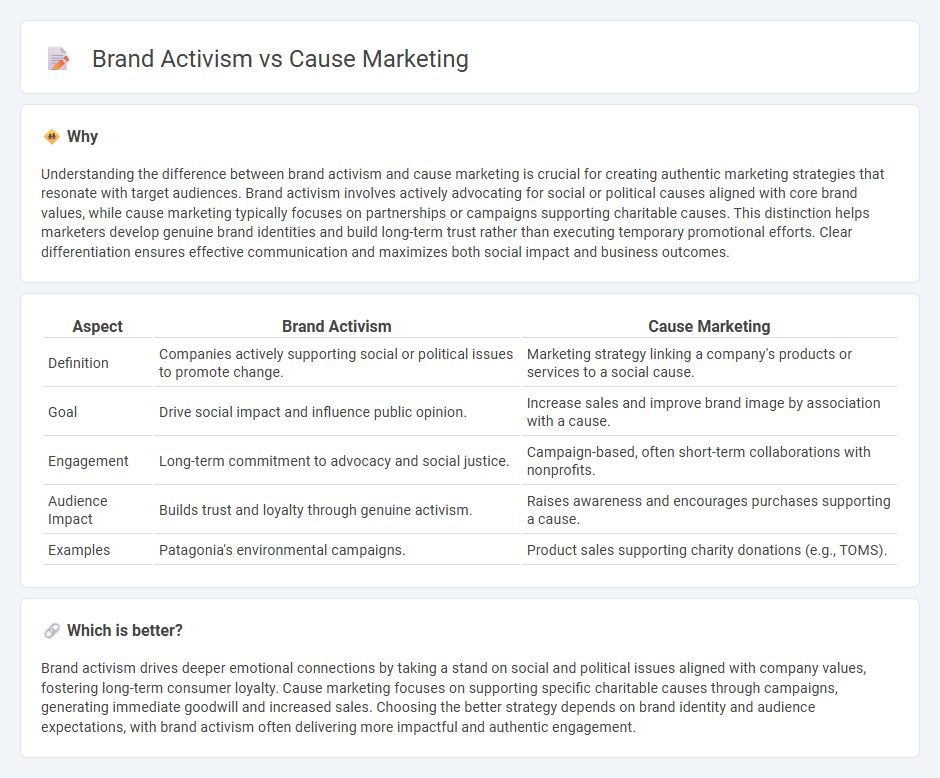
Brand activism involves companies taking explicit, public stances on social, political, or environmental issues, aiming to influence change and connect deeply with purpose-driven consumers. Cause marketing focuses on partnership between a business and a non-profit, promoting specific charitable causes to boost brand image and drive sales. Explore the distinctions and benefits of brand activism versus cause marketing to enhance your marketing strategy.
Why it is important
Understanding the difference between brand activism and cause marketing is crucial for creating authentic marketing strategies that resonate with target audiences. Brand activism involves actively advocating for social or political causes aligned with core brand values, while cause marketing typically focuses on partnerships or campaigns supporting charitable causes. This distinction helps marketers develop genuine brand identities and build long-term trust rather than executing temporary promotional efforts. Clear differentiation ensures effective communication and maximizes both social impact and business outcomes.
Comparison Table
| Aspect | Brand Activism | Cause Marketing |
|---|---|---|
| Definition | Companies actively supporting social or political issues to promote change. | Marketing strategy linking a company's products or services to a social cause. |
| Goal | Drive social impact and influence public opinion. | Increase sales and improve brand image by association with a cause. |
| Engagement | Long-term commitment to advocacy and social justice. | Campaign-based, often short-term collaborations with nonprofits. |
| Audience Impact | Builds trust and loyalty through genuine activism. | Raises awareness and encourages purchases supporting a cause. |
| Examples | Patagonia's environmental campaigns. | Product sales supporting charity donations (e.g., TOMS). |
Which is better?
Brand activism drives deeper emotional connections by taking a stand on social and political issues aligned with company values, fostering long-term consumer loyalty. Cause marketing focuses on supporting specific charitable causes through campaigns, generating immediate goodwill and increased sales. Choosing the better strategy depends on brand identity and audience expectations, with brand activism often delivering more impactful and authentic engagement.
Connection
Brand activism and cause marketing intersect by leveraging social or environmental issues to strengthen brand identity and consumer loyalty. Both strategies focus on authentic engagement with societal values, driving awareness and supporting causes that resonate with target audiences. Effective implementation enhances brand equity while fostering meaningful community impact.
Key Terms
**Cause Marketing:**
Cause marketing aligns a brand with social or environmental issues to drive consumer engagement and enhance corporate reputation through partnerships with non-profits or campaigns. It leverages storytelling and emotional appeals to create positive associations, boost sales, and demonstrate corporate social responsibility. Explore how cause marketing strategies can effectively connect your brand with meaningful causes to inspire loyalty and impact.
Partnership
Cause marketing and brand activism both emphasize partnerships, but cause marketing typically involves temporary collaborations with nonprofits to drive sales and awareness, while brand activism reflects a deeper, long-term commitment to social or environmental issues integrated into a company's core values. Effective partnerships in cause marketing often leverage joint campaigns to engage consumers and raise funds, whereas brand activism partnerships foster systemic change through advocacy and policy influence. Explore how strategic partnerships can amplify impact in both approaches.
Fundraising
Cause marketing integrates corporate social responsibility with promotional efforts, driving fundraising by aligning brand campaigns with charitable causes, which boosts customer engagement and sales. Brand activism goes deeper, positioning companies as advocates for social or environmental justice by mobilizing resources and public support to effect systemic change through targeted fundraising initiatives. Explore effective strategies to leverage both approaches for maximizing impact and donor participation.
Source and External Links
Effective Strategies for Successful Cause Marketing - Cause marketing is a collaborative approach between organizations to support social, environmental, or awareness-based causes, aimed at building brand awareness, trust, and customer loyalty while serving a community-oriented mission.
How Brands Are Driving $2B+ in Social Impact (2025) - Cause marketing creates mutually beneficial partnerships between for-profit businesses and nonprofits to raise funds, awareness, and influence social and environmental change through various campaign types backed by strong consumer trust and market growth.
What is Cause Marketing? - Cause marketing is a strategic collaboration between businesses and nonprofits that enhances brand loyalty and awareness while benefiting the partner organization by amplifying its mission and visibility.
 dowidth.com
dowidth.com